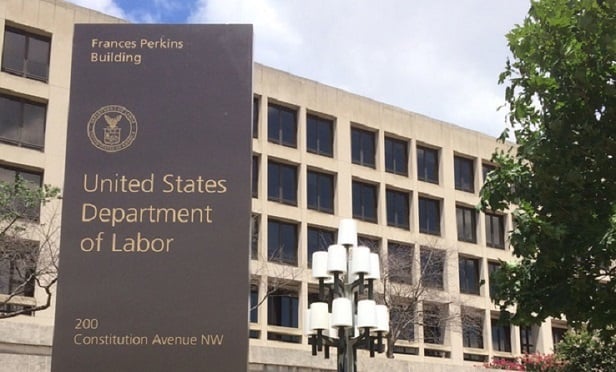To see more behavioral health coverage parity guidelines idea cards, click on the arrow on the right side of the gallery box above.
•
For more behavioral health benefits coverage, see Mental Health Payers Ask Trump Team to Ax Obama-Era Disclosure Rules.
•
The Trump administration recently put out a major, little-noticed packet of documents that sends a clear message: Federal agencies still want to drop a heavy hammer on health insurers and group health plans that fail to comply with federal mental health and addiction treatment benefits parity rules.
The new packet could affect any clients who are trying to get health insurers or health plans to cover services such as inpatient care for anorexia, depression or opioid addiction.
Officials developed the new document packet to help members of the public understand how the Trump administration interprets the Mental Health Parity and Addiction Equity Act of 2008 (MHPAEA).
(Related: Milliman Finds Huge Mental Health Care Access Gap)
The packet could also affect any producers with benefits clients who are wondering what they can, and can’t, do to defend themselves against unqualified or unscrupulous behavioral services providers.
The Centers for Medicaid and Medicaid Services (CMS) worked on the documents together with the Employee Benefits Security Administration (EBSA).EBSA has posted a neatly organized collection of links to the packet here.
CMS is the arm of the U.S. Department of Health and Human Services (HHS) that oversees HHS regulations that affect commercial health insurance.
EBSA is the arm of the U.S. Department of Labor (DOL) that oversees DOL regulations that affect employee benefit plans.
The Mental Health Parity and Addiction Equity Act of 2008 (MHPAEA)
Before the MHPAEA came along, an earlier federal parity required any group health plan that chose to cover or mental health services to make the co-payments, benefits limits and other quantitative provisions comparable for mental health care and other types of care.
MHPAEA takes the parity rules further. It does not require any plan to cover mental health care or addiction treatment services. But, if a “large group plan” chooses to cover behavioral health care, then the “nonquantitative treatment limits,” or NQTLs, for behavioral care must be about the same as the limits for physical care, unless the plan can show that complying with the MHPAEA will increase the plan’s costs by about 1% or more.
For MHPAEA purposes, the size cut-off for a “large group” is 51 employees in some states and 101 employees in others.
While former President Barack Obama was in office, HHS, DOL and the U.S. Department of Treasury required all individual and small-group major medical plans that are required to comply with Affordable Care Act benefits standards to offer MHPAEA-compliant behavioral benefits.
The MHPAEA Packet
The packet includes:
- A report on what EBSA found when it investigated health plans for MHPAEA violations. EBSA found, for example, a fully insured health plan in San Francisco that excluded any coverage for chronic behavior disorders, but not for chronic medical health problems. The plan also required prior authorization for non-emergency admissions to mental health treatment facilities, but not for non-emergency admissions to facilities for surgery. EBSA notes that it needs help from state insurance regulators to get health insurers to meet MHPAEA requirements.
- A “tool,” or guide, that insurers and plans can use to see if they are complying with MHPAEA requirements.
- A standardized draft form that patients and providers could use to get information relevant to MHPAEA parity from health insurers or health plans.
- A draft of proposed CMS and EBSA answers to commonly asked questions about the MHPAEA, such as whether it’s OK if a plan provider directory to list a psychiatrist who stopped participating in the plan three years earlier.
3 Takeaways for Agents, Brokers and Benefits Consultants
President Donald Trump and officials in his administration have talked. generally, about easing the burden of regulations and compliance on U.S. companies. But they have also talked about improving access to behavioral health care as a way to cope with problems such as opioid abuse and mass shootings.
At a time when any bipartisan actions in Congress are noteworthy, Republicans in the House have expressed strong support for efforts by Rep. Joe Kennedy III, D-Mass., to improve enforcement of the existing MHPAEA requirements. That bipartisan cooperation helped lead to the inclusion of a parity provision in the 21st Century Cures Act of 2016.
For agents, brokers and other benefits advisors, the new MHPAEA packet shows that health insurers and health plans are still on the defense when it comes to talking about mental health and addiction treatment benefits.
Here are three things for producers to know about how the Trump administration sees parity issues.
1. Administration officials hope to say tough things to insurers.
In the proposed set of answers to frequently asked questions, CMS and EBSA officials say that, under the MHPAEA and federal rules, a large group health plan can still exclude all coverage for a particular disorder, such as bipolar disorder, without violating the MHPAEA.
But the officials say that providers of ACA-compliant individual and small-group major medical coverage must cover conditions such as bipolar disorder.
The officials reject almost all of the other behavioral health coverage limitation scenarios described in the questions.
The officials include, for example, a question about reimbursement guidelines for care that might be classified as experimental. The Hayes Medical Technology Directory grades treatments on how well justified they seem to be. In one question, a patient asks whether a health plan can cover medical treatments with a Hayes grade of “C” or below on a case-by-case basis, but exclude all coverage for behavioral health care strategies with a Hayes grade of “C” or below.
The officials reject that use of the Hayes grades. “A medical management standard that limits or excludes benefits based on whether a treatment is experimental or investigative is an NQTL under MHPAEA,” officials write.
If a plan requires more Hayes grade evidence for a covering behavioral health care than for covering other care, that plan is violating the MHPAEA, officials write.
2. Administration officials hope to say tough things to health plan sponsors.
The officials include a patient question about an employer plan provider directory that lists a psychiatrist who left the plan’s provider network three years earlier.
The employer is big enough to come under the requirements of the Employee Retirement Income Security Act of 1974 (ERISA).
“When I began making calls to find a replacement provider, it became clear that the entire directory is out of date and inaccurate,” the patient says. “Is this permissible?”
“No,” officials write, in the proposed answer. “If an ERISA-covered plan utilizes a network, its [summary plan description] must provide a general description of the provider network. The list of providers in that SPD must be up-to-date, accurate, and complete (using reasonable efforts).”
An employer can provide the provider list by giving employees a link to an online version of the provider directory, but a sponsor of an ERISA-covered plan must disclose any material modifications in the provider directory, or other summary plan description information, within 210 calendar days after the close of the plan year in which the change was made, officials write.
A carrier that issues an individual or small-group plan purchased through the Affordable Care Act public exchange system must make sure its provider directories are up-to-date and accurate, officials write.
EBSA notes in its report that an investigative commission recommended that DOL get more authority to levy monetary penalties both on insurers and plan sponsors that violate parity requirements.
“The department concurs with these recommendations as positive changes that will enable the department to more effectively enforce MHPAEA,” EBSA officials write in the report.
3. The new DOL group disability claim standards are now in effect.
EBSA and CMS officials do not talk about the DOL’s new group disability claim administration standards in the MHPAEA packet, but EBSA put a major new set of DOL group disability claim administration standards into effect April 1.
DOL officials postponed implementation of the group disability claim standards for three months, but they said when they decided to let the standards take effect that insurers, employer groups and other critics of the standards had failed to provide any concrete evidence that the new standards would cause problems.
The Trump administration has taken a different approach than the Obama administration in connection with parts of the Affordable Care Act and the DOL fiduciary rule, but the new MHPAEA packet raises the possibility that the Trump administration could end up taking a similar approach on other matters.
— Read Sweeping Federal Disability Claims Take Effect Sunday on ThinkAdvisor.
— Connect with ThinkAdvisor Life/Health on Facebook and Twitter.







 April 30, 2018 at 01:41 PM
April 30, 2018 at 01:41 PM
















 Slideshow
Slideshow





